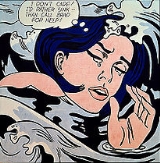
Roy Lichtenstein
Roy Lichtenstein was a prominent American pop artist, whose work borrowed heavily from popular advertising and comic book styles, which he himself described as being "as artificial as possible."
Unsourced
- Art doesn't transform. It just plain forms.
- I got the idea of doing really simple minded pictures that would look inept and kind of stupid and the colour would look as if it wasn't art.
- I like to pretend that my art has nothing to do with me.
- I think I am anti-experimental and anti-contemplative, anti-nuance, anti-getting away from the tyranny of the rectangle, anti-movement and light, anti-mystery, anti-paint quality, anti-Zen and anti all of those brilliant ideas of preceding movements which everyone understands so thoroughly.
- I want my images to be as critical, as threatening and as insistent as possible.
- I'd always wanted to know the difference between a mark that was art and one that wasn't.
- It's not saying that commercial art is terrible or 'look what we've come to' — that may be a sociological fact but it's not what this art is about.
- My work doesn't look like a painting ... it looks like the thing itself.
- My work is about our American definition of images,and visual communication.
- One would hardly look at my work and think it wasn't satirical, I think, or that it makes no social comment. I'm not really sure what social message my art carries, if any.
- Pop Art is actually industrial painting, it is what the whole world will soon become.
- The obvious things influenced by Cezanne statement about cubes, cones and cylinders all got made into art objects ... and nonsense ... sometimes it was beautiful nonsense.
- We like to think of industrialization as being despicable. I don't really know what to make of it. There’s something terribly brittle about it. I suppose I would still prefer to sit under a tree with a picnic basket rather than under a gas pump, but signs and comic strips are interesting as subject matter. There are certain things that are usable, forceful, and vital about commercial art. We're using those things — but we're not really advocating stupidity, international teenagerism, and terrorism.
- What interests me is to paint the kind of antisensitivity that impregnates modern civilization. I think art since Cezanne has become extremely romantic and unrealistic, feeding on art. It is Utopian. It has less and less to do with the world. It looks inward — neo-Zen and all that. Pop Art looks out into the world. It doesn't look like a painting of something, it looks like the thing itself.
- I think Picasso would have thrown up if he'd seen my versions. Maybe not, though. Maybe he would have fallen in love with them and then destroyed all his other work. - 1988 (From Fitzgerald, Michael, Picasso and American Art, Whitney Museum, New York 2007; p.239)
Criticism
- At his weakest Lichtenstein seems the very opposite of a truly popular artist. He is claustrophobically obsessed with art itself and ideas about art.
- Attributed to Edward Lucie-Smith
